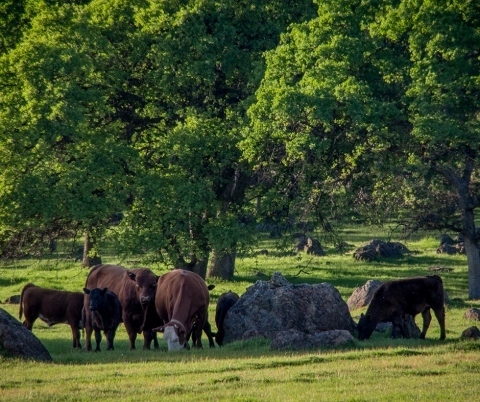Regenerative Grazing to Mitigate Climate Change (2021-2022)
The 2018 Intergovernmental Panel on Climate Change confirmed that previous climate change predictions were drastic underestimates and warming must be capped at 1.5 degrees to avoid extreme climate disruptions. Fortunately, there is potential for agriculture, representing 13.5% of global greenhouse gas emissions, to cut its emissions and store additional carbon dioxide in soil.
Cattle are the largest contributor to agriculture emissions, but recent research shows promising results for pasture-based carbon sequestration as a climate solution in the southeastern United States. Regenerative grazing provides carbon sequestration as well as social benefits, such as rural economic development and resilience-building. This team investigated mechanisms to fund and support the expansion of regenerative grazing practices through policy interventions and carbon offsets.
Timing
Fall 2021 – Spring 2022
Team Outputs
It's Not the Cow, It's the How: New Agro-Ecological Approaches to Livestock Management (2022 Fortin Foundation Bass Connections Virtual Showcase)
Regenerative Grazing to Mitigate Climate Change: It's Not the COW, It's the HOW (poster by Francesca Chiappetta, Laura Mindlin, Lydie Costes, Megan Mason Dister, Alix Foster, Abby Martell, Eric Mullen, Addie Navarro, Marco Paternoster and Margaret Reed, presented at Fortin Foundation Bass Connections Showcase, Duke University, April 13, 2022)
See earlier related team, Regenerative Grazing to Mitigate Climate Change (2020-2021).

Team Leaders
- Matthew Arsenault, Duke Carbon Offsets Initiative
- Emma Fulop, Duke Carbon Offsets Initiative
- Daniel (Lee) Miller, Duke Law
- Michelle Nowlin, Duke Law
/graduate Team Members
-
Lydie Costes, Master of Environmental Management
-
Marco Paternoster, Juris Doctor
-
Laura Navarro, Master of Environmental Management
-
Laura Mindlin, Master of Environmental Management, Environmental Economics/Policy, Community Based Environmental
-
Abby Martell, Master of Environmental Management, Business and Environment
-
Kacey Katzenmeyer, Master of Environmental Management, Business and Environment
-
Alix Foster, Master of Environmental Management
-
Megan Dister, Public Int & Public Svce Law-C
-
Francesca Chiappetta, Master of Environmental Management
/undergraduate Team Members
-
Stephon Ricks, Computer Science (BS)
-
Margaret Reed, Interdepartmental Major
/yfaculty/staff Team Members
-
Jennifer Swenson, Nicholas School of the Environment-Environmental Sciences and Policy
-
Elizabeth Shapiro-Garza, Nicholas School of the Environment-Environmental Sciences and Policy
-
Daniel Richter, Nicholas School of the Environment-Environmental Sciences and Policy
-
David Johnston, Nicholas School of the Environment-Marine Science and Conservation
/zcommunity Team Members
-
Andrea Padillio Guerroro, Undergraduate Student, NC State University
-
Nick Wood, Carolina Farm Stewardship Association
-
Matt Poore, North Carolina State University
-
Jennifer Curtis, Firsthand Foods
-
David Mullen, Undergraduate Student, NC State University
-
Michelle Lovejoy, NC Foundation on Soil and Water Conservation
-
Laura Lengnick, Cultivating Resilience, LLC
-
Alan Franzluebbers, North Carolina State University
